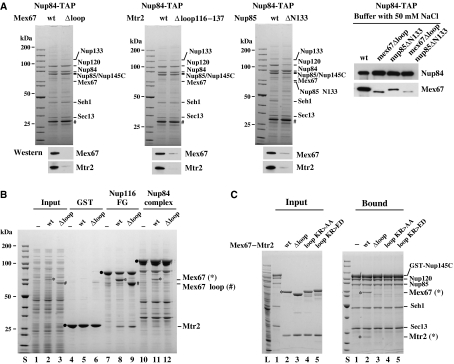Figure 2.
The loop-confined surface on the Mex67–Mtr2 heterodimer is involved to bind to the Nup84 complex. (A) Deletion of the loop region of Mex67 or Mtr2, or the N-terminus of Nup85 impaired the interaction of Mex67–Mtr2 and the Nup84 complex. Nup84 complex was affinity purified under standard TAP conditions (100 mM NaCl) or low-salt conditions (50 mM NaCl) by genomic TAP-tagged Nup84 from the indicated wild-type and mutant cells. Mutant cells include the loop deletion of Mex67 (408–435 aa), the partial loop deletion of Mtr2 (116–137 aa) and the truncation of the first 133 amino acids of Nup85. Eluates by TEV protease were analyzed by SDS–PAGE and Coomassie staining and western blotting using antibodies against Mex67 and Mtr2. Also a protein standard is shown. Prominent bands are indicated on the right. TEV protease is indicated by #. (B) The Mex67 loop deletion decreases binding to the Nup84 complex but not to FG repeats in vitro. GST alone (lanes 4–6), recombinant GST-Nup116 FG repeats (lanes 7–9) and the reconstituted Nup84 complex (lanes 10–12) were immobilized on GSH beads and incubated with an E. coli lysate devoid of Mex67–Mtr2 (input in lane 1; binding in lanes 4, 7 and 10) or containing recombinant Mex67–Mtr2 (input in lane 2; binding in lanes 5, 8 and 11) or mutant Mex67Δloop-Mtr2 (input in lane 3; binding in lanes 6, 9 and 12). Proteins bound to the beads were eluted in SDS sample buffer and analyzed by SDS–PAGE and Coomassie staining. Indicated is the position of the GST and GST-tagged proteins (filled circles), of wild-type Mex67 (*), Mex67Δloop (#) and Mtr2. (C) Mutation of positively charged amino acids in the Mex67 loop inhibits binding of Mex67–Mtr2 to the Nup84 complex. Recombinant Nup84 complex immobilized on GSH beads (bound; lanes 1–5) was incubated with an E. coli lysate in the absence (bound; lanes 1) or the presence recombinant wild-type Mex67–Mtr2 (input; lane 2), Mex67Δloop-Mtr2 (input; lane 3), Mex67 loop KR>AA-Mtr2 (input; lane 4) and Mex67 loop KR>ED-Mtr2 (input; lane 5). Proteins bound to the beads were eluted in SDS sample buffer and analyzed by SDS–PAGE and Coomassie staining. Indicated are Mex67 and Mtr2.

